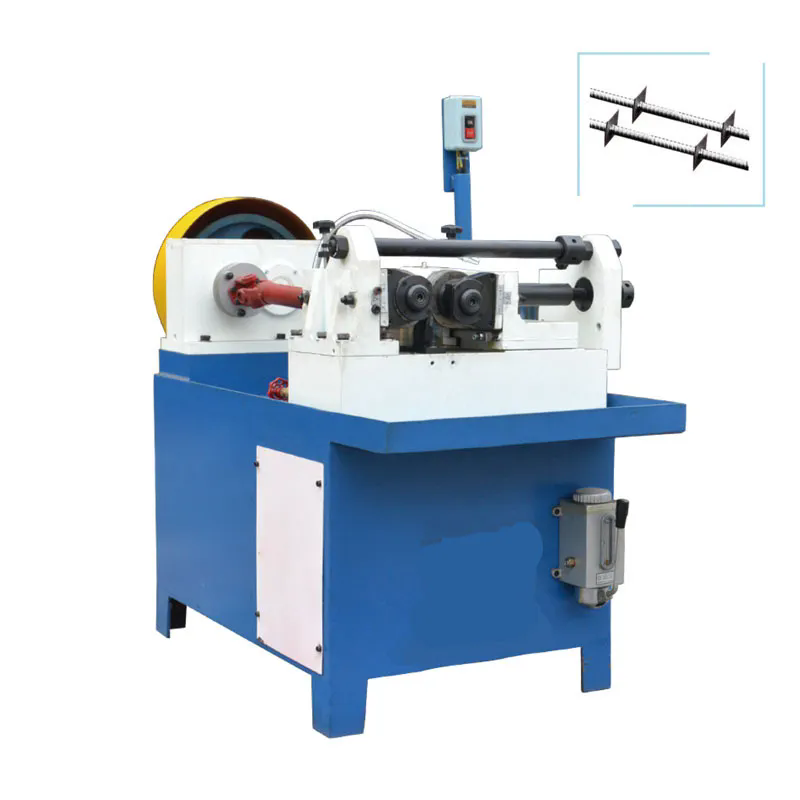The Future of Precision Manufacturing: Exploring Self-Tapping Screw Rolling Machines
2024-08-15
In the world of manufacturing and industrial production, precision and efficiency are key factors that drive success. Among the critical tools that enhance these aspects are self-tapping screw rolling machines. These machines play a vital role in producing high-quality self-tapping screws, which are essential components in various applications, from construction to electronics. In this blog, we will delve into the benefits, features, and applications of self-tapping screw rolling machines, and explore why they are indispensable in modern manufacturing.
1. What is a Self-Tapping Screw Rolling Machine?
A self-tapping screw rolling machine is a specialized piece of equipment designed to manufacture self-tapping screws. These screws are known for their ability to create their own threads as they are driven into materials, eliminating the need for pre-tapped holes. The rolling machine shapes and forms the screws from raw material, typically metal, using a rolling process that involves compressing the material to create the desired screw profile.
2. Key Features of Self-Tapping Screw Rolling Machines
Self-tapping screw rolling machines come with several important features that make them suitable for precision manufacturing:
- High Precision: These machines are engineered to produce screws with exact dimensions and thread profiles. Advanced technology ensures consistent quality and adherence to specifications.
- Efficient Production: Self-tapping screw rolling machines are designed for high-speed production, allowing manufacturers to produce large quantities of screws quickly and efficiently.
- Durability and Reliability: Built with robust materials and components, these machines are designed to withstand the rigors of continuous operation and provide reliable performance over time.
- Versatility: Many self-tapping screw rolling machines can be adjusted to produce various types and sizes of screws, making them versatile tools for different manufacturing needs.
- Automated Operation: Modern machines often feature automated processes for loading, feeding, and ejection, reducing manual labor and enhancing production efficiency.
- Reduced Waste: The rolling process used in these machines is highly efficient, with minimal material waste compared to traditional cutting methods.
3. Benefits of Using Self-Tapping Screw Rolling Machines
The use of self-tapping screw rolling machines offers several key benefits to manufacturers:
- Enhanced Efficiency: The ability to produce screws quickly and in high volumes reduces production time and costs. This efficiency is crucial for meeting demand and maintaining competitiveness in the market.
- Cost Savings: The rolling process is generally more cost-effective than traditional machining methods, as it reduces material waste and the need for additional operations such as threading.
- Improved Quality: High precision and consistent quality are achieved through advanced technology, leading to screws that meet strict quality standards and perform reliably in their applications.
- Increased Production Capacity: The high-speed capabilities of self-tapping screw rolling machines enable manufacturers to scale up production and handle large orders with ease.
- Versatility in Production: The ability to adjust the machine for different screw types and sizes allows manufacturers to diversify their product offerings and respond to changing market demands.
4. Applications of Self-Tapping Screws and Rolling Machines
Self-tapping screws and rolling machines find applications in a wide range of industries:
- Construction: Self-tapping screws are widely used in the construction industry for securing materials such as wood, metal, and plastic. The rolling machines ensure that screws meet the necessary strength and durability requirements.
- Automotive: In the automotive industry, self-tapping screws are used for assembling components and fixtures. Precision manufacturing is essential for ensuring reliable performance and safety.
- Electronics: Self-tapping screws are commonly used in electronic devices and equipment for securing internal components. The rolling machines produce screws with the precise dimensions needed for these applications.
- Furniture Manufacturing: In the furniture industry, self-tapping screws are used for assembly and fastening. Efficient production of screws is crucial for meeting the demands of high-volume furniture production.
- Aerospace: The aerospace industry requires screws with high strength and precision. Self-tapping screw rolling machines ensure that screws meet stringent aerospace standards and specifications.
5. Considerations When Choosing a Self-Tapping Screw Rolling Machine
When selecting a self-tapping screw rolling machine, consider the following factors:
- Production Requirements: Evaluate the machine’s capacity and speed to ensure it meets your production needs. Consider the types and sizes of screws you need to manufacture.
- Quality and Precision: Choose a machine known for its precision and reliability. Look for features that ensure consistent screw quality and adherence to specifications.
- Cost and Budget: Assess the cost of the machine in relation to your budget and expected return on investment. Consider factors such as maintenance costs and energy efficiency.
- Manufacturer Support: Opt for machines from reputable manufacturers who offer good customer support and after-sales service. This ensures that you receive assistance with installation, maintenance, and repairs.
- Automation Features: Consider the level of automation in the machine, as automated features can enhance efficiency and reduce manual labor.
6. Future Trends in Screw Rolling Technology
As technology continues to advance, self-tapping screw rolling machines are expected to see innovations in several areas:
- Smart Technology: Integration of smart technology and data analytics may provide real-time monitoring and optimization of the rolling process, enhancing efficiency and quality.
- Sustainability: Future machines may focus on reducing environmental impact by using eco-friendly materials and processes, as well as improving energy efficiency.
- Enhanced Automation: Continued advancements in automation technology may lead to more sophisticated and automated rolling machines, further reducing manual intervention and increasing production capabilities.
In conclusion, self-tapping screw rolling machines are essential tools in modern manufacturing, offering precision, efficiency, and versatility in the production of self-tapping screws. By understanding their features, benefits, and applications, manufacturers can make informed decisions and optimize their production processes. As technology evolves, these machines will continue to play a crucial role in meeting the demands of various industries and driving innovation in screw manufacturing.



